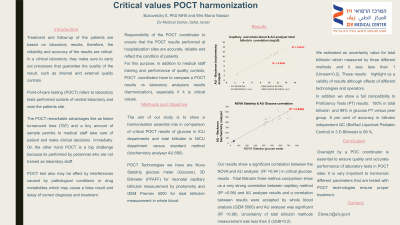Screening Applications & Diagnostics
Poster Session A
(1080-A) Critical values POCT harmonization
Tuesday, May 28, 2024
16:30 - 17:15 CEST
Location: Exhibit Hall


Mona Nassar, Clinical laboratory, Biochemistry
Senior Lab Research POCT Coordinator
Ziv Medical Center
SEFAT, HaZafon, Israel
Poster Presenter(s)
Abstract: Point-of-care testing (POCT) refers to laboratory tests performed outside of central laboratory near the patients site.
The POCT remarkable advantages like as faster turnaround time (TAT) and a tiny amount of sample permits to make clinical decisions immediately. On the other hand, POCT is a big challenge because its performed by personnel who are not trained as laboratory staff.
POCT test may be affect by interferences which may cause a delay of correct diagnosis and treatment. POCT coordinator responsibility is to promise an accurate results by comparison (harmonization) of POCT and laboratory results.
POCT Technologies we have are Nova strip (Glucose) and 3D Bilimeter for neonatal bilirubin measurement.
The aim of our study is to show a harmonization essential role in comparison of critical POCT results versus standard method (chemistry analyser AU 680).
Our results show a significant correlation between the methods (R2 =0.99% in glucose and R2 =0.95% in bilirubin), uncertainty of both tests result was 1 and it highlight us a validity of results although effects of different technologies and operators.
We show a full compatibility to Proficiency Tests (PT) results: 100% in total bilirubin and 98% in glucose PT versus peer group. A per cent of accuracy in bilirubin independent QC (BioRad Liquichek Pediatric Control) in 3 D Bilimeter is 99 %.
This tight supervision and nurse staff teaching let us be sure about quality of results that reflect a real status of the patients.
The POCT remarkable advantages like as faster turnaround time (TAT) and a tiny amount of sample permits to make clinical decisions immediately. On the other hand, POCT is a big challenge because its performed by personnel who are not trained as laboratory staff.
POCT test may be affect by interferences which may cause a delay of correct diagnosis and treatment. POCT coordinator responsibility is to promise an accurate results by comparison (harmonization) of POCT and laboratory results.
POCT Technologies we have are Nova strip (Glucose) and 3D Bilimeter for neonatal bilirubin measurement.
The aim of our study is to show a harmonization essential role in comparison of critical POCT results versus standard method (chemistry analyser AU 680).
Our results show a significant correlation between the methods (R2 =0.99% in glucose and R2 =0.95% in bilirubin), uncertainty of both tests result was 1 and it highlight us a validity of results although effects of different technologies and operators.
We show a full compatibility to Proficiency Tests (PT) results: 100% in total bilirubin and 98% in glucose PT versus peer group. A per cent of accuracy in bilirubin independent QC (BioRad Liquichek Pediatric Control) in 3 D Bilimeter is 99 %.
This tight supervision and nurse staff teaching let us be sure about quality of results that reflect a real status of the patients.
